REGULATIONS ON GRADUATE MEDICAL EDUCATION, 1997
GENERAL CONSIDERATIONS AND TEACHING APPROACH
(1) Graduate medical curriculum is oriented towards training students to undertake the responsibilities of a physician of first contact who is capable of looking after the preventive, promotive, curative & rehabilitative aspect of medicine.
(2) With wide range of career opportunities available today, a graduate has a wide choice of career opportunities. The training, though broad based and flexible should aim to provide an educational experience of the essentials required for health care in our country.
(3) To undertake the responsibilities of service situations which is a changing condition and of various types, it is essential to provide adequate placement training tailored to the needs of such services as to enable the graduates to become effective instruments of implementation of those requirements. To avail of opportunities and be able to conduct professional requirements, the graduate shall endeavour to have acquired basic training in different aspects of medical care.
(4) The importance of the community aspects of health care and of rural health care services is to be recognized. This aspect of education & training of graduates should be adequately recognized in the prescribed curriculum. Its importance has been systematically upgraded over the past years and adequate exposure to such experiences should be available throughout all the three phases of education & training. This has to be further emphasized and intensified by providing exposure to field practice areas and training during the intership period. The aim of the period of rural training during internship is to enable the fresh graduates to function efficiently under such settings.
(5) The educational experience should emphasize health and community orientation instead of only disease and hospital orientation or being-concentrated – on-curative -aspects. As such all the basic concepts of modern scientific medical education are to be adequately dealt with.
(6) There must be enough experiences to be provided for self learning. The methods and techniques that would ensure this must become a part of teaching-learning process.
(7) The medical graduate of modern scientific medicine shall endeavour to become capable of functioning independently in both urban or rural environment. He/she shall endeavour to give emphasis on fundamental aspects of the subjects taught and on common problems of health and disease avoiding unnecessary details of specialization.
(8) The importance of social factors in relation to the problem of health and diseases should receive proper emphasis throughout the course and to achieve this purpose, the educational process should also be community based than only hospital based. The importance of population control and family welfare planning should be emphasized throughout the period of training with the importance of health and development duly emphasized.
(9) Adequate emphasis is to be placed on cultivating logical and scientific habits of thought, clarity of expression and independence of judgment, ability to collect and analyse information and to correlate them.
(10) The educational process should be placed in a historic background as an evolving process and not merely as an acquisition of a large number of disjointed facts without a proper perspective. The history of Medicine with reference to the evolution of medical knowledge both in this country and the rest of the world should form a part of this process.
(11) Lectures alone are generally not adequate as a method of training and are a poor means of transferring/acquiring information and even less effective at skill development and in generating the appropriate attitudes. Every effort should be made to encourage the use of active methods related to demonstration and on first hand experience. Students will be encouraged to learn in small groups, through peer interactions so as to gain maximal experience through contacts with patients and the communities in which they live. While the curriculum objectives often refer to areas of knowledge or science, they are best taught in a setting of clinical relevance and hands on experience for students who assimilate and make this knowledge a part of their own working skills.
(12) The graduate medical education in clinical subjects should be based primarily on out-patient teaching, emergency departments and within the community including peripheral health care institutions. The out-patient departments should be suitably planned to provide training to graduates in small groups.
(13) Clinics should be organised in small groups of preferably not more than 10 students so that a teacher can give personal attention to each student with a view to improve his skill and competence in handling of the patients.
(14) Proper records of the work should be maintained which will form the basis for the students’ internal assessment and should be available to the inspectors at the time of inspection of the college by the Medical Council of India.
(15) Maximal efforts have to be made to encourage integrated teaching between traditional subject areas using a problem based learning approach starting with clinical or community cases and exploring the relevance of various preclinical disciplines in both understanding and resolution of the problem. Every attempt be made to de-emphasize compartmentalisation of disciplines so as to achieve both horizontal and vertical integration in different phases.
(16) Every attempt is to be made to encourage students to participate in group discussions and seminars to enable them to develop personality, character, expression and other faculties which are necessary for a medical graduate to function either in solo practice or as a team leader when he begins his independent career. A discussion group should not have more than 20 students.
(17) Faculty member should avail of modern educational technology while teaching the students and to attain this objective, Medical Education Units/ Departments be established in all medical colleges for faculty development and providing learning resource material to teachers.
(18) To derive maximum advantage out of this revised curriculum, the vacation period to students in one calendar year should not exceed one month, during the 4 ½ years Bachelor of Medicine and Bachelor of Surgery (MBBS) Course.
(19) In order to implement the revised curriculum in toto, State Govts. and Institution Bodies must ensure that adequate financial and technical inputs are provided.


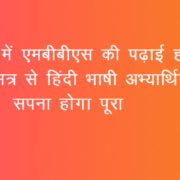


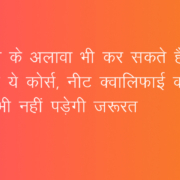
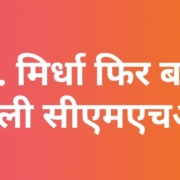

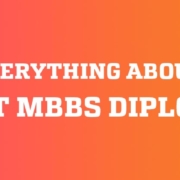
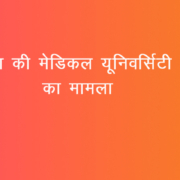
Leave a Reply
Want to join the discussion?Feel free to contribute!